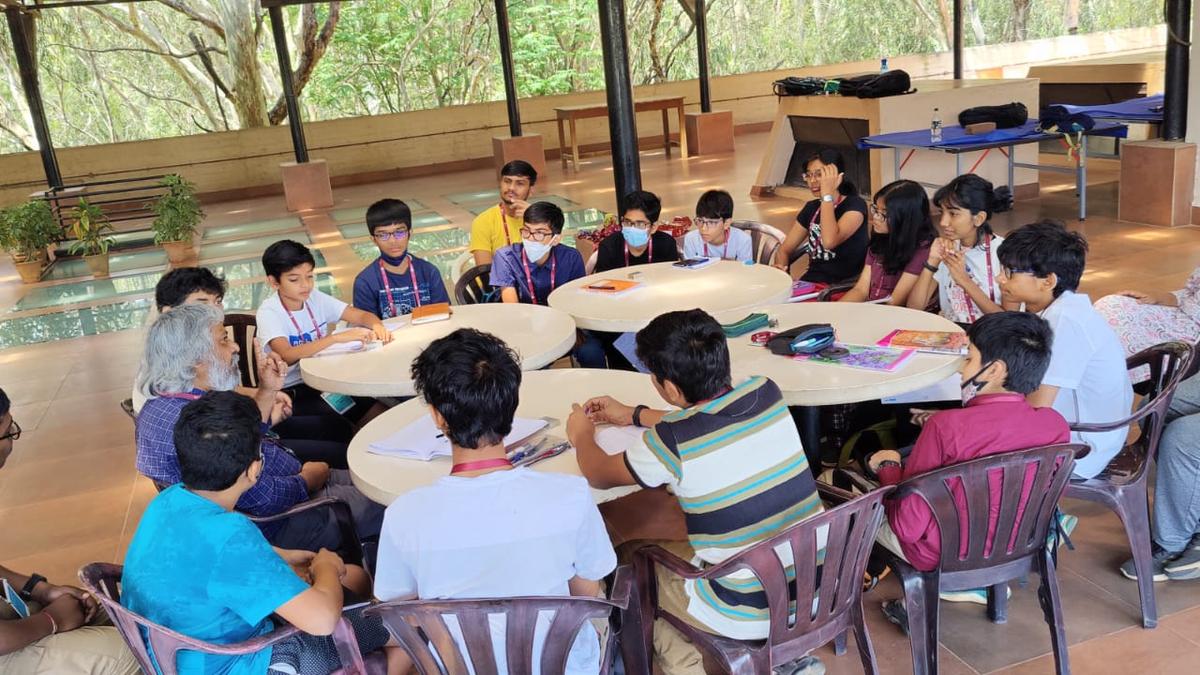
“Maths circles can be a real national movement”
The Hindu
ICTS-RRI Maths Circle nurtures creativity and problem-solving skills in young students through collaborative exploration of mathematics concepts.
Maths has always been Shloka Suraj’s favourite subject. But, in school, she says, it is often taught in a boring way. “They start saying that it is complex, and they make it complex,” says the precocious 10-year-old, a member of the ICTS-RRI Maths Circle, a Bengaluru-based initiative for secondary school students by the International Centre for Theoretical Sciences (ICTS) and Raman Research Institute (RRI).
According to her, teachers don’t always explain the reasoning behind complex concepts. “They make us memorise things. But when we start understanding the why of things, we remember better,” says the home-schooled student. “We can ask why here. Most of the time, they have answers,” she says. “I don’t have to waste my time on assignments and homework and all of that. But we get into really complex domains (here).”
The ICTS-RRI Maths Circle is part of a larger initiative launched by ICTS to identify exceptionally gifted children early and expose them to problem-solving and thinking about Maths in an open-ended way, according to the institute’s website. “There are very talented children in the country but, often, the process kills creativity,” says theoretical physicist Rajesh Gopakumar, Director of ICTS, adding that rote learning or grinding through hours of coaching class is not the best approach to studying the subject. “Mathematical creativity is a very delicate flower,” he says.
The idea of a Maths circle is something Gopakumar has felt passionate about for a long time. “The philosophy that we have been nurturing at ICTS differs from the ones we usually have in these Maths Olympiads or other competition-based events.” The focus (here) is on collaboration, not competition, and is based on open-ended exploration and problem solving rather than on speed solving. “That way, it hopefully unleashes your creativity and ability to ask new questions in Maths. It’s more in that spirit of exploration than getting an answer,” he says, pointing out that this is how Maths research functions “because, in research, half the task is asking the right questions... that’s where the real creative breakthroughs come.”
Maths circles came into being in Bulgaria in the early 1900s, soon spreading to the Soviet Union, says Joseph Samuel, ICTS Endowed Visiting Professor, who has been involved with these sessions. “It was very strong in Eastern Europe. The idea was to get groups of children together and encourage them to engage in mathematical exploration,” he says. Over the years, the idea of bringing talented students together to examine Maths concepts spread worldwide, reaching the U.S. in the 1990s. “ICTS is trying to popularise this in India,” says Samuel.
According to Roshini George, who coordinates the sessions, ICTS launched the initiative in 2019 in collaboration with the National Institute of Advanced Studies (NIAS). The sessions were held at the National Institute of Advanced Studies and run by Pranav Pandit, a professor at ICTS. Once they understood where they wanted to go, they identified talented students and started conducting pilot sessions. “I think there were around 25 or so students for the initial four sessions. ”
Then, the pandemic started, and things came to a halt. In-person sessions gave way to online sessions. Once the worst was over, ICTS considered restarting in-person sessions in addition to online ones. “Online has a larger reach because we are not constrained by distance,” says Samuel. “But, in the in-person sessions, there is more interaction between the students, resulting in peer-group learning.”





















 Run 3 Space | Play Space Running Game
Run 3 Space | Play Space Running Game Traffic Jam 3D | Online Racing Game
Traffic Jam 3D | Online Racing Game Duck Hunt | Play Old Classic Game
Duck Hunt | Play Old Classic Game











